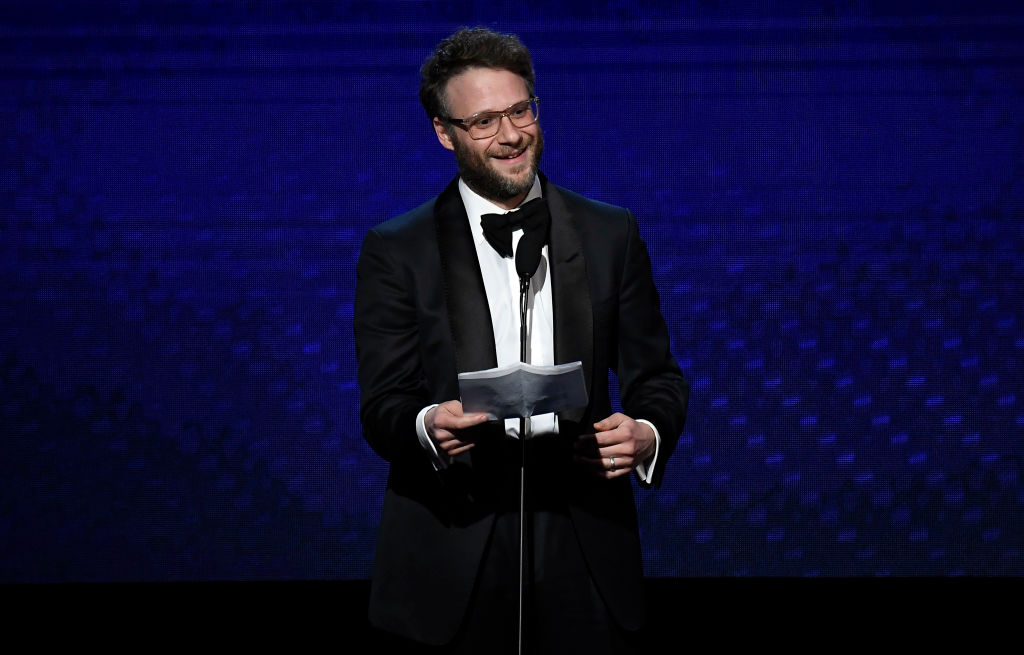Why It Matters That Seth Rogen Spoke Out Against Israel
Seth Rogen grabbed headlines this week for saying he thinks the state of Israel “makes no sense.” He’s right — and his strident words signal a broader shift among young American Jews against Israel’s oppression of the Palestinians.

Seth Rogen speaks onstage at The Beverly Hilton Hotel on November 8, 2019 in Beverly Hills, California. (Frazer Harrison / Getty Images)
In 2014, during one of Israel’s deadliest assaults on Gaza, Seth Rogen was among two hundred Hollywood entertainers who signed a statement in defense of Israel. But this week, on Marc Maron’s podcast, Rogen, a prominent Jewish actor and comedian, said the State of Israel makes no sense to him.
“I don’t understand,” Rogen said. “To me it just seems like an antiquated thought process. If it’s for religious reasons, I don’t agree with it because I think religion is silly. If it is truly for the preservation of Jewish people, it makes no sense, because again, you don’t keep something you’re trying to preserve all in one place, especially when that place has proven to be . . . pretty volatile. ‘I’m trying to keep all these things safe, I’m going to put them in my blender and hope that that’s the best place! That will do it!’ It doesn’t make sense to me.”
He went on to explain: “I also think that as a Jewish person, I was fed a huge amount of lies about Israel my entire life. They never tell you that oh by the way, there were people there. They make it seem like it was just sitting there — oh, the fucking door’s open!”
Ask almost any Jew in America, no matter their opinion on Israel, and they know exactly what Rogen is describing: whether they went to Hebrew School and learned Israeli folk songs that convey the myth that Jews arrived in a barren land, planted trees, built houses, and made a nation flourish and grow, or they heard the constant refrain in synagogue about the need for a Jewish state to serve as our refuge, or they simply imbued the conventional wisdom from the daily news, the message was clear: to be a Jew, you must support Israel.
Yet that one simple, disquieting fact — that another people were already living on the land where Israel was established — persists. Seth Rogen is right: Israel was established through the ethnic cleansing of the Palestinian people. Zionist militias confiscated land, and used terror, assassinations, and massacres — in Deir Yassin, every man, woman, and child in the village was killed — in order to create a Jewish State.
Awareness of this history is not new. Palestinian and Israeli historians alike have related its appalling details for a very long time. But over the past decade, with Israeli brutality in Gaza escalating and further annexation and ethnic cleansing on the agenda, the myth that Israel is a democratic beacon or a helpless victim of Arab aggression has been punctured. And more and more young American Jews, celebrities and non-celebrities alike, are questioning the received wisdom.
The growth of the Palestinian Boycott Divestment and Sanctions campaign has helped translate this growing consciousness into concrete political action. Leftist politicians like Ilhan Omar and Rashida Tlaib have used their platforms to advance the cause of Palestinian liberation. Peter Beinart, one of the foremost intellectuals of the progressive American Jewish community and an outspoken advocate of the Jewish state for many years, recently discarded his “two-state” position in favor of a democratic state for Jews and Palestinians. And now Seth Rogen — the latest sign of the generational sea change.
Previously, young Jewish Americans made up a hardcore contingent of Israel supporters. But in recent years they’ve been abandoning their identification with the Jewish state. Already in 2013, a Pew Research Center survey of Jews found wide generational gaps: among those aged 18 to 49, 39% were “not very attached” or “not at all attached” to Israel, compared to 21% of those 50 and older. Conversely, 35% of younger Jews said that Israel was an “essential part of being Jewish” versus 49% of older Jews.
All signs point to that chasm growing wider in recent years, from the emergence of organizations like Jewish Voice for Peace and IfNotNow, to increasing numbers of young Jews rejecting or speaking out against Birthright tours. Rogen’s candid commentary about the Israeli state, coming from a popular and unmistakably Jewish Jew, will further encourage that shift.
Changes in consciousness among American Jews — who make up less than 2% of the population — will not end US support for the Israeli state. The roots of the US-Israeli partnership in the Middle East lie much deeper than public opinion. But this evolution does provide an important breathing space for organizing — and for forging greater solidarity between Jews and Palestinians in the struggle for liberation.